

Shafting The Poor – Watts Up With That? Red Cross Urges Nations to Provide Climate Adaption Aid to Conflict Zones. Guest essay by Eric Worrall According to the Red Cross, people suffering the combined effects of climate change and conflict need urgent climate aid.

Regions at war harder hit by climate changeLEONARD BLAZEBY5:16PM AUGUST 9, 2020Climate change is unfair. Conflict is cruel. Together they’re devastating.
Energy Poverty and the Developing World. Earth Hour celebrates ignorance, poverty and backwardness. I abhor Earth Hour.
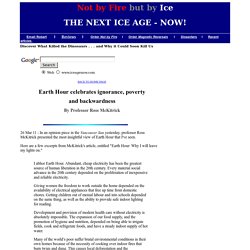
Abundant, cheap electricity has been the greatest source of human liberation in the 20th century. Every material social advance in the 20th century depended on the proliferation of inexpensive and reliable electricity. Poverty and Energy. Texas State Geologist Scott Tinker on Solving Climate Change and Energy Poverty.
Guest geology by David Middleton I spent the past couple of days in Austin, Texas attending the annual meeting of the Applied Geodynamics Laboratory (AGL).
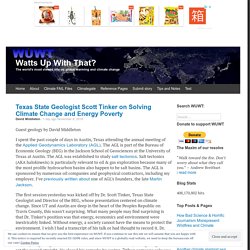
The AGL is part of the Bureau of Economic Geology (BEG) in the Jackson School of Geosciences at the University of Texas at Austin. Chile Explodes: Expensive Climate Policies Spark Mass Riots, Just Like the Yellow Vest Protests in France. Climate activists and the United Nations are suffering a major black eye this week as protests and riots resulting from high energy prices have erupted in Santiago, Chile.
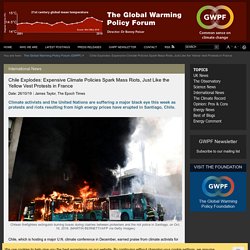
Chile, which is hosting a major U.N. climate conference in December, earned praise from climate activists for recently imposing a carbon dioxide tax on conventional energy sources and switching the Santiago Metro system to renewable power. Now, the people of Chile are rising up and firing a shot across the bow of other nations considering similar energy taxes and expensive renewable energy programs. On Friday, protesters took to the streets throughout Santiago in response to Metro fare hikes. The protests soon spread to other cities and led to rioting and at least five reported deaths. The Chilean government and the legacy media blamed the fare hikes on rising oil prices. Alarmists Getting Exactly What They Wanted. South African Climate Activist Desmond Tutu Calls for Fossil Fuel to be Outlawed. The Guardian: Rebuilding Shattered Climate Action Reputations in the Pacific will require Lots of Aid Money.
Guest essay by Eric Worrall According to The Guardian, Australia’s reputation amongst Pacific islanders is at rock bottom because we haven’t made enough effort on climate change – though providing lots of aid money would help repair that reputation.

Australia’s standing in Pacific has plummeted because of our climate change failureIt’s about the very survival of people, nations and cultures. If action isn’t taken there are islanders who may have nowhere to go.Scott Morrison flew to the Solomon Islands last weekend to “show our Pacific step-up in action” but this policy will fail if his government doesn’t take meaningful action on climate change. Five Surprising Facts About Energy Poverty. The world needs to double or triple its current spending—estimated at about $400 billion a year—to meet the United Nations' goal of bringing clean and modern electricity to all people by 2030, says a new report by a wide group of international agencies led by the World Bank.
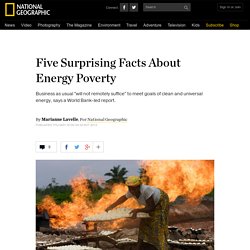
Although nations are succeeding in bringing power to more people, those efforts have barely kept pace with population growth over the past two decades, said the report, released Tuesday in Vienna. As a result, about 1.2 billion people—nearly as many as the entire population of India—still live without access to electricity, while 2.8 billion people rely on wood, crop waste, dung, and other biomass to cook and heat their homes. Unless the world addresses the widespread problem of energy poverty, the World Bank said, other efforts at economic development are likely to fall short.
(See related story: "The Solvable Problem of Energy Poverty. ") Here are a few of the significant findings of the report: Debunked: Global warming causes inequality? Nonsense! The establishment media last week tripped over themselves to bring attention to a paper by climate alarmists asserting global warming is making global economic inequality worse.

A review of the data show the assertion is nonsense. Noah Diffenbaugh and Marshall Burke co-authored the paper in question ( Both have a long history of publicly asserting a global warming crisis. That being the case, it is in their reputational best interest to present papers further raising – rather than scuttling – alarm about global warming. Their previous activism does not by itself disqualify any assertions in their paper, but it should lead the media and others to look closely and take with a grain of salt any new alarmist claims from the two.
Diffenbaugh and Burke claimed to tease from each nation’s historical gross domestic product an impact from global warming. Reminder: GWPF Report Rocks World Bank Meeting As African Nations & U.S. Question Bank's Green Energy Policy On Poor. WASHINGTON DC – More than half-a-century after it was opened by the Queen Mother in 1960, Kariba is still the world’s biggest dam by volume.
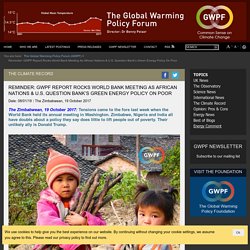
Straddling the Zambezi, it stretches back 220 kilometres from the wall, with a catchment area the size of France. But if Kariba was built today, the World Bank wouldn’t fund it. The Ethics of Climate Change. Calls for massive reductions in global greenhouse gas emissions ignore the impacts on the poor.
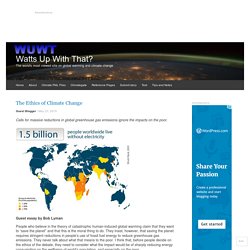
Guest essay by Bob Lyman People who believe in the theory of catastrophic human-induced global warming claim that they want to “save the planet” and that this is the moral thing to do. Who wants to aim for the Paris policy or worse the 2 °C target and starve 84 million more people? Fujimori et al estimate that if we aim for the 2°C Paris commitment as many as 84 million more people will be going hungry by 2050.
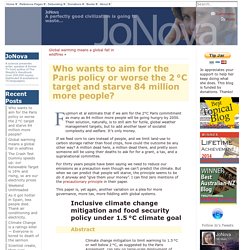
Their solution, naturally, is to still aim for futile, global weather management targets, but to add another layer of socialist complexity and welfare. It’s only money. If we feed corn to cars instead of people, and we limit land-use to carbon storage rather than food crops, how could the outcome be any other way? Energy. The Challenge Around 19% of the world’s population, about 1.4 billion people, have no access to electricity at all. Lack of electricity in Africa remains one of the biggest barriers to the region’s development and prosperity, and continues to trap millions of people in extreme poverty. Sub-Saharan Africa accounts for 13% of the world’s population, but only 4% of its energy demand.Thirty seven countries in sub-Saharan Africa have a national electrification rate of below 50%.
As a result, quality of life is severely diminished, resulting in needless deaths and stifled economic growth. In 2012, of the 915 million people living in sub-Saharan Africa, nearly 730 million people in sub-Saharan Africa heat their homes and cook using traditional fuels like wood and dung. Countries with electrification rates of less than 80% of the population consistently suffer from reduced GDP per capita. Rates of progress for expanding electricity access are good, but not nearly sufficient enough. Biofuel Madness: Another Disastrous Impact of Global Warming Deception. How the war on climate change slams the world’s poor. When a “solution” to a problem causes more damage than the problem, policymaking has gone awry. That’s where we often find ourselves with global warming today.
Activist organizations like Worldwatch argue that higher temperatures will make more people hungry, so drastic carbon cuts are needed. But a comprehensive new study published in Nature Climate Change led by researchers from the International Institute for Applied Systems Analysis has found that strong global climate action would cause far more hunger and food insecurity than climate change itself. The scientists used eight global-agricultural models to analyze various scenarios between now and 2050. These models suggest, on average, that climate change could put an extra 24 million people at risk of hunger. Trying to help 24 million people by imperiling 78 million people’s lives is a very poor policy. If we want to eradicate hunger, there are more effective ways. We need to get smarter about climate change.
Have The Poorest Countries Been Hit Hardest By Climate Change/Global Warming?
Energy Poverty--Germany. Energy Poverty in the US. Video: why renewables equal death. UN Climate Demand Opens the way for More Abuse of Poor Farmers. Climate & Carbon Taxes Could Lead To More Hunger & Food Insecurity Than Climate Change Itself - The Global Warming Policy Forum (GWPF)The Global Warming Policy Forum (GWPF) Energy Poverty Kills More People Than Coal and Cecil B. DeMille… Combined!
Guest sequel by David Middleton This is sort of a sequel to Environmental Groups Claim Coal Killed 7,600 People in Europe in 2016… Can’t Name Any of the Victims. Air Pollution Kills More People Than Cecil B. DeMille The World Health Organization estimates that ambient (outdoor) air pollution kills (premature deaths) about 4.2 million people per year. At least some of these nameless deaths could possibly be chalked up to coal. Figure 1. Biomass burning and/or household biofuel yield more nitrogen oxides, carbon monoxide, black carbon, organic carbon, ammonia and nitrous oxide than the entire power sector.
In the area of fine particulate matter, we can also see that the energy sector, of which coal is a subset, is only responsible for a fraction of dreaded PM2.5 pollution: Figure 2. Benny Peiser: What I Told Cambridge University’s Spoiled Green Students. The Cruelest Tax Of All. Cold homes and energy poverty. While this paper makes some good points about fuel poverty and energy cost, they bit hook line and sinker the ridiculous recent claim of Super exponential accelerating CO2 growth and cited it as a reference – Anthony Three reasons to act: the health burden, inequity, and mitigation.